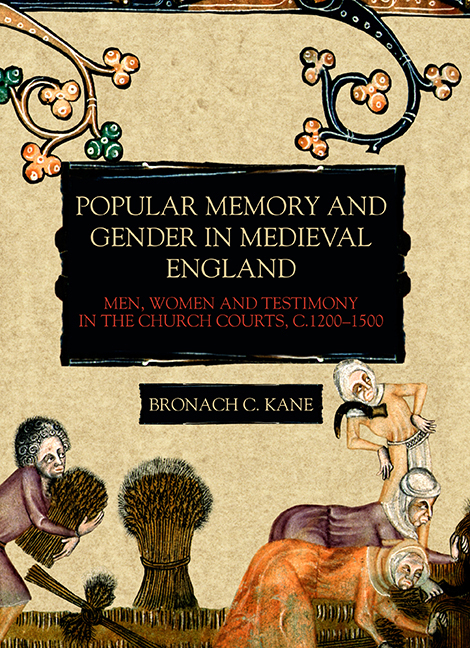 Popular Memory and Gender in Medieval England
Popular Memory and Gender in Medieval England Book contents
- Frontmatter
- Dedication
- CONTENTS
- List of Abbreviations
- Introduction
- Chapter 1 Pastoral Care, Canon Law, and Social Relations
- Chapter 2 Gender, Narrative, and Testimony
- Chapter 3 Bodily Practices
- Chapter 4 Sexuality and Generation
- Chapter 5 Marriage, Kinship, and Widowhood
- Chapter 6 Orality, Written Memory, and Custom
- Chapter 7 Place, Landscape, and Gender
- Conclusion
- Bibliography
- Acknowledgements
- Index
- Gender in the Middle Ages
Chapter 2 - Gender, Narrative, and Testimony
Published online by Cambridge University Press: 03 September 2019
- Frontmatter
- Dedication
- CONTENTS
- List of Abbreviations
- Introduction
- Chapter 1 Pastoral Care, Canon Law, and Social Relations
- Chapter 2 Gender, Narrative, and Testimony
- Chapter 3 Bodily Practices
- Chapter 4 Sexuality and Generation
- Chapter 5 Marriage, Kinship, and Widowhood
- Chapter 6 Orality, Written Memory, and Custom
- Chapter 7 Place, Landscape, and Gender
- Conclusion
- Bibliography
- Acknowledgements
- Index
- Gender in the Middle Ages
Summary
In the Wife of Bath's Prologue, Alison criticised the misogynistic tales told in the ‘book of wikked wyves’ from which Jankyn, her husband, read every night. Central to the Wife's complaint was the extent of clerical control over the production of widely known depictions of women, exemplified in her reference to Aesop's fabled argument between the lion and the man. Drawing on this analogy, the Wife challenged misogynistic representations of women in her rhetorical question, ‘who peyntede the leon, tel me who?’, noting that female accounts of men's deeds would contain more wickedness ‘than al the mark of Adam may redresse’. Commonly cited in studies of medieval gender relations, Alison's commentary emphasises clerical authority over written narratives about women, as well as the extent to which men dictated the contemporary cultural memory of women in formal histories. Numerous works on literary practices, however, demonstrate female involvement in areas beyond reading and writing, including book ownership, patronage, and other literate activities that often occurred in family settings and within other social networks. Indeed, the eponymous Wife undermined her husband's control over stories about women, ripping pages from his book and inducing him to burn it in the fire after his brutal attack upon her. Memories of her previous marriages also acted as a form of counter-memory, ostensibly narrated from the female position but in practice ventriloquized through Chaucer himself.
Perceptions of the comparative reliability of men and women's testimony in the church courts reflected broader gendered attitudes towards memory and speech, as well as assumptions about gendered areas of expertise. Male fantasies of the dangers of women's collective talk shaped portrayals of female testimony. Communal gatherings of women could be associated with the conspiratorial intent to fabricate evidence, in keeping with their supposed innate habit of dissimulation. The choice of witness in legal suits was influenced by gendered assumptions about trustworthiness which coalesced with expectations about the spheres of activity in which men and women more commonly acted. Cases concerning parish rights and tithes, for instance, usually relied upon male rather than female testimony. Men and women tended to give testimony alongside each other in suits concerning marriage and defamation, which often turned on issues of sexuality and desire in ways that mattered more to the reputations of young unmarried women.
- Type
- Chapter
- Information
- Popular Memory and Gender in Medieval EnglandMen, Women, and Testimony in the Church Courts, c.1200–1500, pp. 57 - 80Publisher: Boydell & BrewerPrint publication year: 2019


